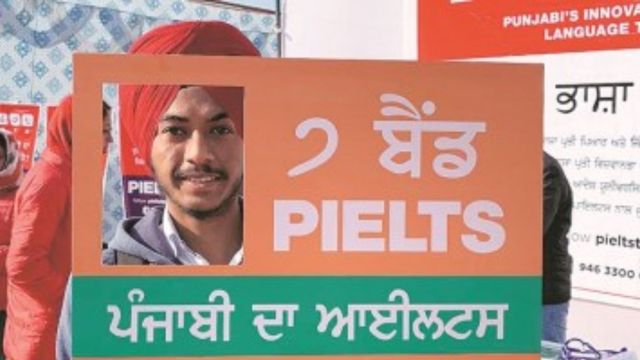When translation of an Act and its rules into Punjabi is a herculean task
Punjab's labour department and the Building and Other Construction Workers Welfare Board are finding it difficult to get the BOCW Act 1996 and related rules translated into Punjabi as demanded by a labour rights activist around 20 months ago.
 The labour department said it had also approached three universities, which also expressed inability to translate the Act and the rules into Punjabi. (Representational)
The labour department said it had also approached three universities, which also expressed inability to translate the Act and the rules into Punjabi. (Representational)“Punjabiye zabane ni rakane mere des diye, fiki pai gayi chehre di nuhaar ni, meedhian khilaari phiren Bulleh diye kaafiye ni, kiney tera laah leya shingaar ni (O the sophisticated Punjabi language of my state, the charm of your face has diminished. A literary piece of Bulleh Shah, you are roaming with messed up hair. Who has stripped you of your beauty?)”
This cult song of Gurdas Maan rings true in a sense in Punjab, where getting an Act and its rules translated into Punjabi, the official language, has become a herculean task for government officials. This is despite the fact that Punjab has three state-run universities and a dedicated language department.
Punjab’s labour department and the Building and Other Construction Workers (BOCW) Welfare Board are finding it quite difficult to get BOCW Act 1996 and related rules translated into Punjabi as demanded by a labour rights activist under the Right to Information Act around 20 months ago.
When Patiala-based activist Vijay Walia approached the board with an RTI application in August 2022, he did not expect the wait to be endless.
Meanwhile, four orders to promote Punjabi
While Walia is yet to get the information he sought, incidentally, the higher education and language departments issued as many as four orders between February 2020 and December 2022 directing that Punjabi be given “more importance” by mentioning the names of all government offices, departments, institutions, boards, road names, milestones in the official language at the top.
An analysis of the correspondences, replies and orders involving the Punjab State Information Commission, the board, the labour department, Punjabi University in Patiala and Walia by The Indian Express reveals that even the Estimates Committee of the state Assembly had sought the translated copies of the Acts and the rules, but the labour department had found itself unable to arrange them.
Walia said that while translation of various labour Acts and rules into Punjabi would entail a much larger exercise, the copies of pages of specific sections and rules he sought did not exceed 25.
When contacted, Manvesh Singh Sidhu, secretary at the labour department, said, “It (the Act and the rules) has been sent to the language department. They are still working on it. We don’t have the expertise to translate into Punjab. We have also sent reminders to the language department. In one of the replies we received, they asked us to get it translated from a legal luminary. But we told them that they can get that done from a legal luminary.”
Sidhu added, “Once we receive the translation, we will circulate it.”
In a response sent to board on April 20 last year, a copy of which is with The Indian Express, the Punjab language department turned down the request to translate the Punjab BOCW Rules 2008 citing “shortage of translators” and “already pending works”.
The labour department said it had also approached three universities, which also expressed inability to translate the Act and the rules into Punjabi.
Labour Commissioner Tej Partap Singh Phoolka, who is also secretary of the Punjab BOCW Welfare Board, said, “We had written regarding translation to three universities. They said they will not be able to translate it. We don’t have the resources to translate. The Act has to be translated in a proper format.”
In a correspondence with the state information commission on December 13 last year, the board’s public information officer wrote that it was the job of the labour department to get the BOCW Act and the rules translated into Punjabi.
RTI request, complaint and appeal
After failing to get the information under the RTI Act, Walia had to file a complaint, then an appeal with the appellate authority followed by another appeal with the information commission.
On March 22, in the latest development in Walia’s quest to get the information, the board, while seeking to quash the appeal by Walia, stated in in a representation to the information commission, “First of all, labour department will get the Board (read BOCW) rules translated into Punjabi from Punjab languages department or languages department of any government university. After that the translated rules would be thoroughly scrutinised by the Board officers and subsequently after the approval of Board secretary, the rules would be sent to LR (Legal Remembrancer) for vetting. After vetting by the LR, the translated rules would be sent for cabinet approval. After this exercise, Board rules would be notified in Punjabi.”
The correspondence by the board’s deputy secretary added, “As per the above, the labour department has initiated the process. So it is requested that this case may be quashed.”
Reacting sharply, Walia in a letter sent to the information commission on March 28 alleged the board had “misled” the commission.
Referring to earlier directions issued by the information commission on his appeals, Walia alleged that board officials “did not adhere to the directions deliberately” as they “do not want to provide information relating to the constitutional rights of 25 lakh construction labourers, and want to continue with their exploitation”.
Walia said the “translation exercise” detailed by the board was “wrong”. He stated that the exercise was needed in forming new rules, but “not in translating existing ones”.
“BOCW Act 1996 is a Central Act. Any change in it could be made only by the Government of India,” Walia wrote, seeking “strict action” against the board’s public information officer under the RTI Act for “not providing the requested information” and for “not adhering” to orders of the information commission.
Labour Secretary Sidhu, however, said there was “no need” for the procedure mentioned in the correspondence by the board and that whosoever sent the correspondence was “not aware of that”.
‘Exploitation by middlemen’
Walia, meanwhile, told The Indian Express, “In the absence of BOCW Act and rules in Punjabi, the construction workers are subject to exploitation by the middlemen. This is because the majority of the construction workers cannot comprehend the Act and rules in English and have no choice but to approach middlemen for the redressal of their grievances.”
In a hard-hitting order on July 31 last year, the information commission “reminded” the board’s public information officer that “the official language of the State Government is Punjabi and from time to time instructions/directions have been issued by the Government that official work/business be conducted in Punjabi language”.
Noting that commission was of the “considered view” that Walia’s request was “reasonable and in the larger interest of the public”, the order asked the board’s public information officer to get the specific sections of the BOCW Act and the related rules translated into Punjabi and furnish them to the appellant, along with a copy to the commission.
In an earlier order, the commission had directed the board to get the Act and rules translated into Punjabi and upload them on the board’s website in a time-bound manner.











